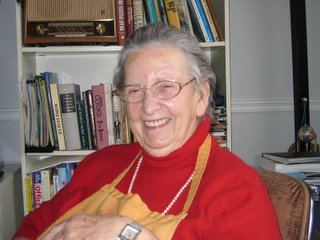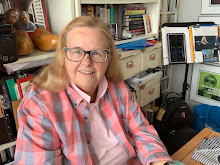
December 28th, 2005 was the most devastating day of my life.
My dear, dear Mother died !
She was very sick in hospital for about 5 weeks, and in the end she passed away from Kidney failure. We all, the family, my friends, close relatives are all in shock. How could this happen? She was in our eyes the strongest of them all… Mom, Aleida gone, died.. how could this be? She is so strong? But.. In the end she was not strong enough and her poor body had finally given out!
I will miss her so so so much… I was very close to my Mother, and I feel like there is now a giant gap, a great hole in my life.
Now I will have to learn how to live with out her. It will be hard, but I will have no choice, and just have to do it !
Oh.. MOM I miss you so much… Oh Mom I love you so much..
I hope to see you one day again!
I will love you for ever..
your daughter Wendy

_____________________________________________________________________________
ALEIDA LIMBERTIE-FOUNDING DIRECTOR OF COMMUNITY FOLK ART COUNCIL OF TORONTO-DIES IN TORONTO HOSPITAL
PRESS RELEASE December 28, 2005
The death of Aleida Limbertie, founding director of Toronto’s Community Folk Art Council was announced today by her family.
Born in Groningen, The Netherlands June 18, 1926 where her father, Siebe Jan Bouma, was municipal architect and her mother -Harmina Anna Wolters- a nurse, she was the oldest of the family with three sisters Hilda, Maya and Annelies, and brother Bob. All the children were implicated in their father’s love of buildings, helping him document the built history of Groningen through photography and painting. In 1942 Bouma was appointed director of the famous Netherlands Open Air Museum in Arnhem where the family lived during the difficult years of WWII before being evacuated to Apeldoorn. After the war, the family moved to Enkhuizen where Bouma conceived, designed and built the Zuyderzee museum to document the vanishing way of life in fishing villages along the Zuyder Zee. Bouma died in 1959, while working for the Dutch Ministry of Education, Culture and Science as architect of Madurodam, the miniature city in The Hague.
Much influenced by her father, Aleida attended Folk High Schools in both Norway and Denmark before taking degrees in art history from both the Municipal University in Amsterdam and the University of Oslo and worked for some time as a weaver in the studio of ‘de Knipscheer’ in Laren. She married Adrian Limbertie, an umbrella salesman, in 1954 and emigrated with him and their young daughter Ineke to Canada the following year.
She started her Canadian career at Simpson’s where she excelled as an interior designer. When daughters Wendy, Melinda and Maya were born, her husband’s successful travel agency allowed her to be a stay-at-home mother. She had time on her hands to develop her passion for folklore and was one of the first to realize the wealth of material that thousands of immigrants had brought to Toronto.
Together with a group of like-minded Dutch, she started the Netherlands Folklore Group in 1964 and was honoured to be invited to participate in that country’s National Day celebrations at Expo 67 in Montréal. For her pioneering efforts, she was awarded the Centennial Medal of Canada.
Inspired by the dynamics of Canada’s Centennial celebrations, in 1968 she initiated Toronto’s Easter around the World festival at Old City Hall, where for the first time, Torontonians could view the wonders of Ukrainian pysanky, the Dutch palmpasenstok, Polish kielbasa, Macedonian burek…the list includes some 30 cultures that exhibited their food, dance and music to enthusiastic crowds that first weekend.
Encouraged by this success, the group of ethnic leaders formed the Community Folk Art Council of Toronto, with a mandate to 'promote the preservation, development and advancement of the cultural, and artistic heritage of the people of Toronto' and in 1969, the first Christmas around the World festival was organized. For many years, she also led the Amsterdam pavilion during Toronto’s International Caravan Festival.
As Toronto grew and diversified, so did Aleida intensify her efforts to showcase our increasingly multicultural city. The Toronto International Festivals held at Nathan Phillip Square during the 1980’s presented folkloric dance from around the world, including invited groups from China, Russia and Brazil. She regarded as a highlight the tour of Northern Ontario she organized with Toronto-based folkloric groups, delighting audiences in Cochrane, Moosonee and Moose Factory with hopak and kolo. When Skydome opened, she orchestrated the ‘This is Toronto’ portion of the opening show that featured 1800 folkloric dancers representing some 60 different cultures. She always loved parades so that on Canada Day 1993 she organized ‘We came to build’, with hundreds of performers dancing down Yonge Street. In 1993, for her services to the preservation of Dutch culture among immigrants here, she was also knighted by Queen Beatrix of the Netherlands.
The impressive quality of Toronto’s folkloric dancers caught the eyes of international folklore festival programmers and upon her retirement from the Community Folk Art Council in 1995, Aleida was nominated to the board of Folklore Canada International, the Montréal-based Canadian arm of CIOFF, a UNESCO member organization. On their behalf, she sent hundreds of performers around the world to represent Canada at folkloric festivals in Taiwan, Korea, Mexico, Peru, Brazil, the United States and throughout Europe.
In the months leading up to her death, she was working on a cherished dream of an International Festival showcasing European folklore here in Toronto.
Aleida is survived by her four daughters, five grandchildren and an extended family around the world.
The memorial service will be held at Our Lady of Lourdes Shrine, Wellesley Street Thursday, January 5 2006 at 1 :00 p.m.


















No comments:
Post a Comment